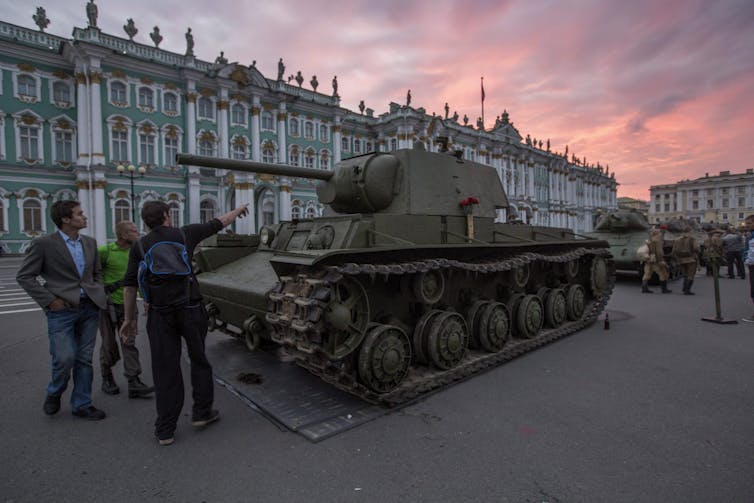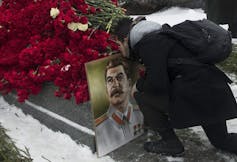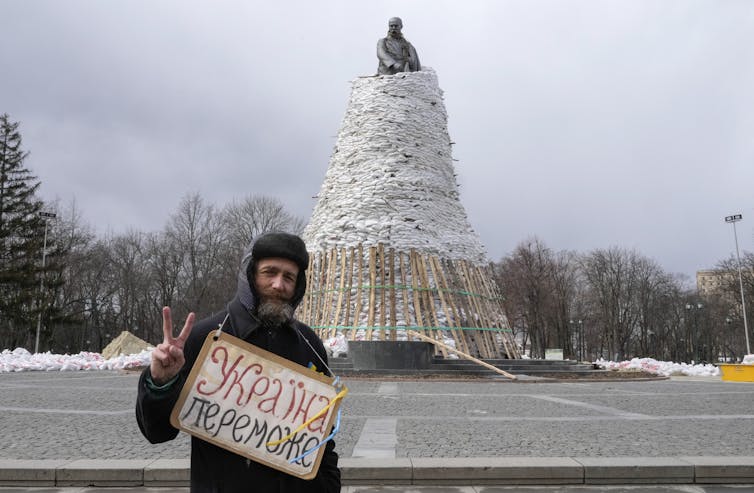
Oleksa Drachewych, Western University
Russian media references to the “de-Nazification” of Ukraine to justify its invasion have placed Russia'a fascination with the Second World War in the public eye.
Russian President Vladimir Putin and his government say they’re fighting a threat equal to Nazi Germany. While this perspective is absurd to the global community, it may draw upon Russian memories of the Second World War.
These memories regard Soviet sacrifices as Russian sacrifice, and the Soviet Union’s victory over Nazism one of the great triumphs of the Russian people.
Actions and statements by Russian leaders and its military suggest the Soviet experience in the Second World War is inspiring their current approach.
How today’s Russians recall the war
In June 2020, Putin wrote an article detailing his interpretation of the causes and key events of the Second World War.
He emphasized Soviet sacrifice, but also the supposedly legitimate aims of the Soviet Union. He argued the West deserved more blame for failing to stop Adolf Hitler’s aggression, foreshadowing his current rhetoric regarding the West’s relationship with Ukraine.
Putin argued the Soviets acted in the best interests of the people of Poland, Belarus and Ukraine through the German-Soviet Nonaggression Pact that pledged neither country would take any military action against the other for 10 years.

In the process, he ignored Soviet collaboration with the Nazis in their invasion of Poland and the fact that Soviet Red Army soldiers were rarely seen as liberators in these nations. Finally, he downplayed any Soviet atrocities in favour of emphasizing the collaboration of eastern Europeans with the Nazis.
Historians who study Russia and eastern Europe, including myself, have argued that Russia’s actions in Ukraine reflect a desire to resurrect the Russian Empire.
To Putin, the nation of Ukraine is artificial and does not exist. In his view, Ukrainians are Russians, hearkening back to Russification efforts under czardom.
Echoes of Soviet rhetoric and action during the Second World War are also increasingly present in how Russia, its state media and its leaders have depicted the war in Ukraine. Reports of the use of the slogan “our cause is just” — nashe delo pravoe — are direct references to slogans used by Soviets when they fought Nazi Germany.

Soviet foreign minister Vyacheslav Molotov and Soviet leader Joseph Stalin each used this slogan in the first speeches they gave after the Nazis invaded the Soviet Union in June 1941.
Some historians have highlighted the similarities between the horrifying scenes in Bucha, a suburb of Ukraine, to the Katyn Massacre, a series of mass executions of more than 20,000 Polish military officers and prisoners of war carried out by the Soviet Union.
Defining ‘de-Nazification’
Another connection between the Second World War and the current war comes in how the word “de-Nazification” is used. On April 3, 2022, Russian state news outlet RIA Novosti published an editorial by Russian political operator Timofei Sergeitsev.
Sergeitsev, who also claims a Ukrainian nation does not exist, outlined what he believes Russia should do with Ukraine. His suggestions are reminiscent of what the Soviet Union did in East Germany and eastern Europe from 1945 to 1950.
Sergeitsev argues that “passive Nazis” exist in Ukraine. Re-education and harsh censorship are necessary to curb the continued influence of Nazism, he says.
The Second World War connections become clearer in his argument: He says no Marshall Plan — a reference to American investment in Europe after the Second World War to help ensure democracies took hold — should be allowed in Ukraine. The Soviets also refused to allow western investment in the Eastern Bloc as the Cold War began.
Other aims suggested by Sergeitsev include:
- Full military victory over Ukraine
- Elimination of Nazis in all parts of Ukrainian society, culture and politics
- Investigation and imprisonment of war criminals including through the creation of a war tribunal, a nod to the Nuremburg Trials
- Forced labour and public shaming of Nazi “accomplices”
- De-Ukrainization
These claims mirror Soviet actions and viewpoints in the post-Second World War period and during the de-Nazification of Germany.
U.S. historian Norman Naimark has argued Stalin wanted a Germany “weakened politically and economically by the dismantling and removal of industries, the financial burdens of reparations, the elimination of its Nazi and ‘reactionary’ officialdom and the destruction of its war-making potential.”
Stalin also wanted Germany’s “friendly neutrality.” Russia has demanded the same from Ukraine today.
Replaying the Second World War
Putin, Russian state media and other Russians publicly supporting the ongoing war seemingly seek to replay the events of the Second World War to serve their current aims in Ukraine. They want the dismantling of an independent Ukraine.
The Russian government’s downplaying of Russian atrocities in Ukraine mirrors the under-emphasis of Soviet atrocities. Russian violence against the civilian population in Ukraine is reminiscent of the sexual violence perpetrated by the Soviet Red Army in eastern Europe and in Germany decades ago.
Calls for de-Ukrainization and reports of population transfers bring to mind the efforts of the Soviet Union to transfer people in eastern Europe — specifically Ukrainians — to break apart nationalist movements following the Second World War. Post-war famine further allowed the Soviet Union to undermine Ukrainian nationalism.

Ukrainian intelligence has accused Russia of sending Ukrainians to filtration camps. Following the Second World War, the Soviet Union forced returning Red Army troops and prisoners of war to camps to ensure they had not been influenced by the West.
The goal was to either re-assimilate people into society or remove them from it. The Soviet Union also used harsh labour camps, sometimes repurposing Nazi death camps, to imprison Nazis, Ukrainian nationalists and other anti-Soviet people. Thousands died from the harsh conditions following the war.
The Russian memory of the Second World War is not merely for nationalist consumption. The actions of the Soviet Union in defeating Nazi Germany and de-Nazifying eastern Europe appear to be a blueprint for Russia’s ongoing attack on Ukraine.![]()
Oleksa Drachewych, Assistant Professor in History, Western University
This article is republished from The Conversation under a Creative Commons license. Read the original article.

